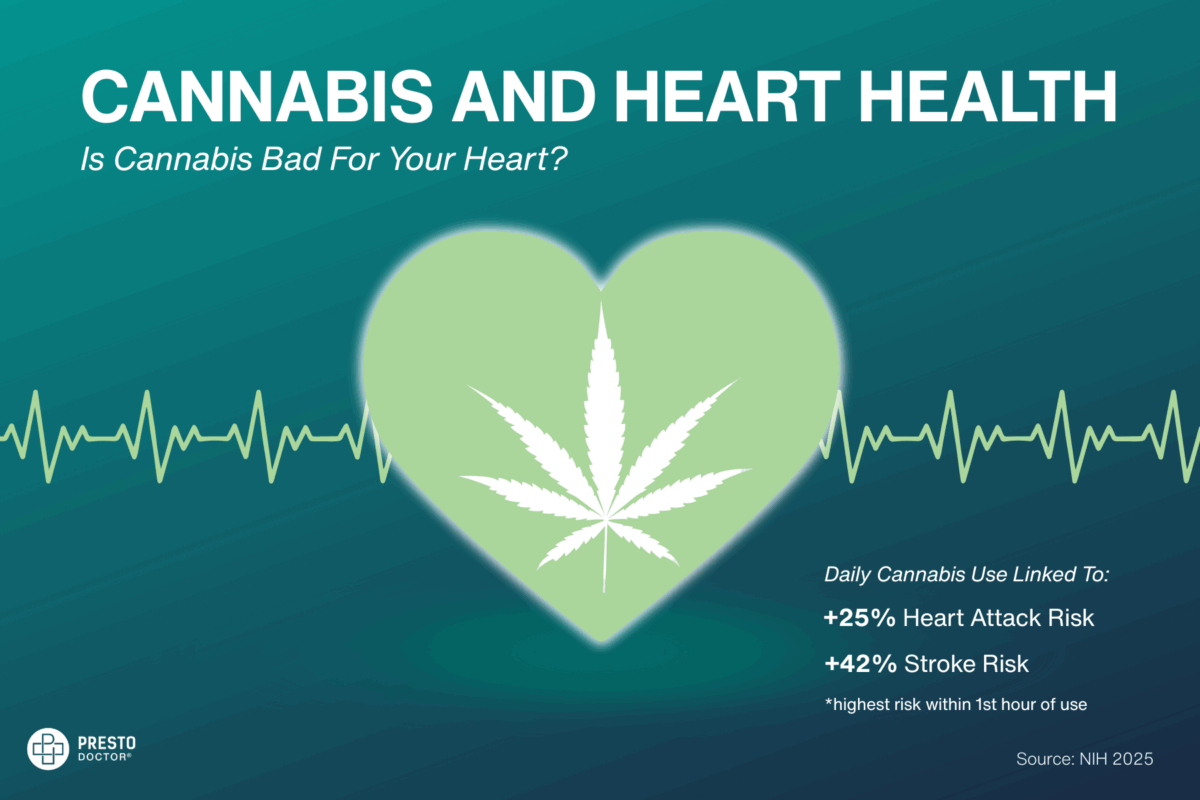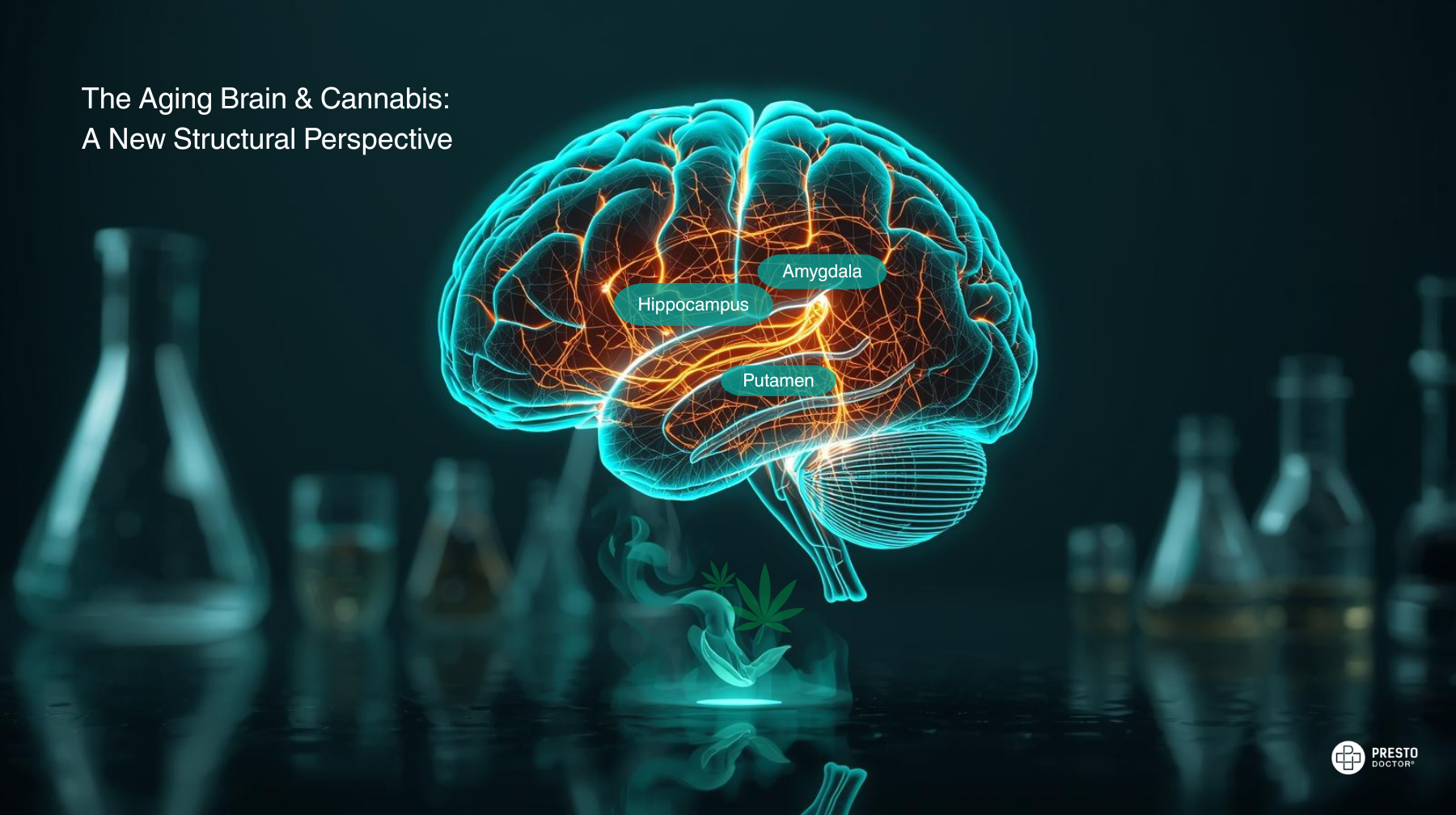
Why Cannabis and Heart Health Is Now a Hot Topic
In 2025, the conversation around cannabis and heart health took a dramatic turn—thanks to a groundbreaking meta-analysis published in the prestigious Heart journal. With cannabis becoming more mainstream, a sharp spotlight is now on its potential to seriously affect cardiovascular health with new findings on how THC can affect the heart. New data indicates that cannabis use—especially when smoked or used frequently—may be linked to significantly higher risks of heart attack, stroke, and cardiovascular-related death. The growing body of research on marijuana heart disease has sparked global concern among cardiologists and public health officials. Now, many cannabis users are wondering how to minimize heart risks with a potentially safer consumption method such as edibles.
This article provides an evidence-based review of the latest findings, expert insights, and guidance for safer cannabis use.
New 2025 Study: Cannabis, Heart Disease, and Cardiovascular Mortality Risk
In June 2025, the peer-reviewed journal Heart published a landmark meta-analysis reviewing 24 observational studies encompassing over 200 million subjects worldwide. The data reveals an alarming trend:
- 29% increased risk of acute coronary syndrome (heart attacks and unstable angina)
- 20% higher chance of ischemic or hemorrhagic stroke
- 2x increased risk of death from cardiovascular disease in regular cannabis users
“We now have robust, global data confirming a consistent link between cannabis use and adverse cardiovascular outcomes,” said Dr. Divyanshu Mohanan, lead author of the study and cardiologist at the All India Institute of Medical Sciences. “The risk was highest in daily users and those who smoked cannabis.” This study, one of the largest cannabis cardiovascular disease analyses to date, is now considered one of the strongest scientific confirmations of a link between cannabis heart disease outcomes and frequency of use.
What Science Says: How Cannabis Affects the Heart and Blood Vessels
Research indicates that cannabis, especially its psychoactive compound THC, interacts with the endocannabinoid system in ways that can stress the cardiovascular system. Key physiological effects include:
- Vasoconstriction: Narrowing of blood vessels, which increases blood pressure and heart strain.
- Tachycardia: Rapid heartbeat often follows cannabis use, increasing oxygen demand.
- Oxidative stress and inflammation: Leads to damage in endothelial cells lining blood vessels.
- Platelet activation: May increase the risk of clot formation and atherosclerosis.
These factors combined can elevate the risk of sudden cardiac events, even in young and otherwise healthy users. Cannabis/THC may elevate the risk of heart attacks, while long-term use increases the odds of stroke, often referred to in studies as weed and stroke risk.
Who Is Most at Risk?
While cardiovascular risk rises for all cannabis users, some groups are particularly vulnerable:
- Young adults under 50: Disproportionately affected by acute coronary syndrome linked to cannabis use.
- Daily users and high-THC product consumers: Highest risk group across all studies.
- Patients with existing cardiovascular conditions: Exponentially increased risk of complications.
- Polysubstance users: Those combining cannabis with tobacco, alcohol, or stimulants.
These findings reinforce that cannabis heart disease is not limited to older adults, but increasingly affects young and otherwise healthy individuals. According to Dr. Salim Virani, Chair of Preventive Cardiology at Baylor College of Medicine, “Cannabis may act as a trigger in people with pre-existing endothelial dysfunction, similar to how heavy exertion can precipitate heart attacks.”
Healthcare providers are increasingly screening patients for cannabis smoking and cardiovascular health concerns, especially in those with pre-existing heart conditions. The risk profiles highlight worsening cannabis heart risk in young adults and those unaware of their marijuana heart health status.
2025 Comparison: Cannabis vs. Tobacco on Heart Health
Although tobacco remains the leading cause of preventable cardiovascular death, cannabis is not far behind in certain metrics—particularly when smoked. Studies show that cannabis-related heart death is rising. The American Heart Association (AHA) has now called for treating cannabis with the same caution as tobacco in clinical risk assessments.
| Substance | Heart Attack Risk | Stroke Risk | Cardiovascular Mortality |
|---|---|---|---|
| Tobacco (daily use) | +40% | +60% | 2.5x risk |
| Cannabis (daily use) | +29% | +20% | 2x risk |
Delivery Methods: Smoking vs. Edibles vs. Vaping
The method of cannabis intake plays a major role in the severity and onset of cannabis heart disease symptoms, according to new cardiovascular data. Cannabis smoke and heart attack risk are closely linked, while vaping cannabis presents emerging cardiovascular risks.
- Smoking: Highest cardiovascular risk due to carbon monoxide, tar, and rapid THC absorption.
- Vaping: Still presents risks due to heated oils and solvents, though data is less conclusive.
- Edibles: Avoid combustion but still deliver THC systemically, potentially affecting vascular health.
“No route is entirely risk-free,” noted Dr. Thomas Münzel, vascular specialist at the University Medical Center Mainz. “But cannabis edibles and tinctures may carry relatively lower heart risk when used infrequently.”
What the Experts Are Saying
- American College of Cardiology (ACC): Urges providers to screen for cannabis use during patient assessments.
- UCSF Division of Cardiology: Recommends warning labels on cannabis products akin to tobacco warnings.
- Dr. Nora Volkow, NIH: “The public perception of cannabis as ‘safe’ is increasingly at odds with emerging cardiovascular data.”
- Experts from the AHA: Emphasize the growing concerns around cannabis and heart disease risk.
Tips for Safer Use and Risk Mitigation
- Use lower-THC products or consider CBD-dominant alternatives.
- Avoid smoking cannabis; opt for non-combustion methods for cardiovascular health.
- Limit use frequency, particularly if under age 50 or with known heart issues.
- Speak openly with your healthcare provider about cannabis use and get a cardiovascular screening if needed.
While cannabis smoking and cardiovascular health risks remain significant, alternative consumption methods such as edibles may offer a safer profile for some users. For those concerned about oral cannabis consumption and heart disease, tinctures may offer a less risky method.
Conclusion: Rethinking Cannabis Use in Light of 2025 Evidence
The newest science makes it clear: cannabis is not benign when it comes to heart health. While occasional use in healthy individuals may carry limited risk, regular or high-dose consumption—especially via smoking—could double your chances of dying from heart-related causes. As cannabis becomes more accepted and accessible, it’s essential to understand and respect its potential impact on your cardiovascular system. Understanding the relationship between cannabis smoking and cardiovascular health can help users make informed choices and reduce their risk of adverse cardiac events. Given the mounting evidence of marijuana and cardiovascular disease risk, caution is critical.
With clear associations between cannabis use and cardiovascular mortality, cannabis heart disease should be taken seriously by both recreational and medical users. PrestoDoctor is here to help you make informed choices. Speak with a medical cannabis expert today to explore safer ways to manage your health without compromising your heart.
FAQs
1. Is cannabis now proven to cause heart attacks?
While causation is not fully established, the June 2025 meta-analysis confirms a 29% increased risk of heart attack in cannabis users, especially heavy users and smokers. Studies on THC effects on the heart suggest a consistent pattern of acute strain and arrhythmias.
2. Is edibles or smoking more dangerous for the heart?
Smoking carries higher risk due to combustion byproducts, but cannabis edibles still deliver THC systemically, which may affect blood vessels and heart function.
3. What’s the safest way to use cannabis for someone with heart issues?
Low-THC edibles or tinctures, used sparingly and under physician guidance, are considered safer alternatives to smoking or vaping.
4. Does CBD affect heart health the same way as THC?
No. Most studies indicate CBD does not have the same cardiovascular risks and affect on the heart as THC. In fact, it may offer some anti-inflammatory benefits, though more research is needed.
5. Should I stop using cannabis if I have high blood pressure?
It’s strongly advised to consult a healthcare provider. Elevated blood pressure combined with THC-induced vascular stress could increase your heart risk.






